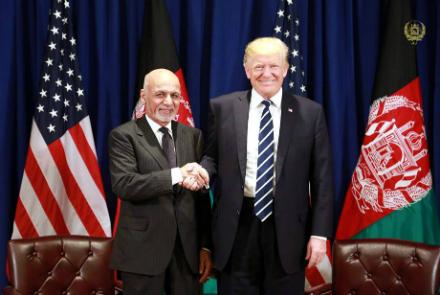In a letter to US President Donald Trump, President Ashraf Ghani asked him to slow down the withdrawal of American troops from Afghanistan and suggested cutting costs for the US where possible.
According to the New York Times, the letter was confirmed by three officials and described by one who had seen its contents.
The Times reported the letter was sent to Trump on Tuesday via Alice Wells, the principal deputy assistant secretary for South and Central Asia, who had been visiting Kabul.
The New York Times quoted a senior Afghan official who spoke on condition of anonymity as saying that the language of Ghani’s letter was broad — asking for teams from both sides to discuss details of where costs could be reduced, and how the troop levels could be brought down from the current 14,000 to a “more efficient level.”
The Times report stated that the official said the possibilities they had envisioned could save as much as $2 billion a year for the United States, drawing from areas such as maintenance contracts, and reducing the level of American troops to as low as 3,000.
An Afghan military affairs analyst Saleh Registani said Ghani is “struggling for his survival” with such offers.
“(President) Ashraf Ghani knows that he is the ‘main loser’ of peace talks and by such letters he wants to struggle for his survival,” he said, adding that “no doubt, a hasty withdrawal will open the way for another civil war.”
“Opposite to our leaders, Trump is mostly thinking about his country’s interests. The ‘bargaining’ by President Ghani who vows to reduce the costs does not have any importance for the United States,” said Musa Fariwar, a university lecturer.
Ghani meanwhile seemed unhappy about US-Taliban talks as he addressed a gathering of at least 2,500 youths from across Afghanistan on Wednesday where they discussed the peace process and ways to move it forward.
“If someone thinks that they will sign another Gandamak treaty by Ashraf Ghani, I will not do such ‘shameful’ work even if I lose my blood,” Ghani said.
The Treaty of Gandamak officially ended the first phase of the Second Anglo-Afghan War. It was signed on 26 May 1879 by King Mohammad Yaqub Khan of Afghanistan and Sir Louis Cavagnari of British’s Government of India at a British army camp near the village of Gandamak, about 110km east of Kabul.
The treaty was ratified by Lord Edward Robert Bulwer Lytton, Viceroy of India, on 30 May 1879.
Ghani’s move comes after US Special Envoy Zalmay Khalilzad said the key for peace was in the hands of Afghans. He made the remark during a media briefing in Kabul following last week’s Doha talks.
Khalilzad’s remark on “the key for peace” was met with mixed reaction by Afghan analysts and mainstream political parties.
Some said that the key to peace does not lie in Kabul, but lies rather in Rawalpindi.
According to Ghani, “the key to peace is in Afghanistan because we have the scheme, plan and roadmap for peace, but the key for war is in Islamabad, Quetta and Rawalpindi”.


